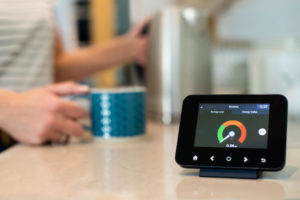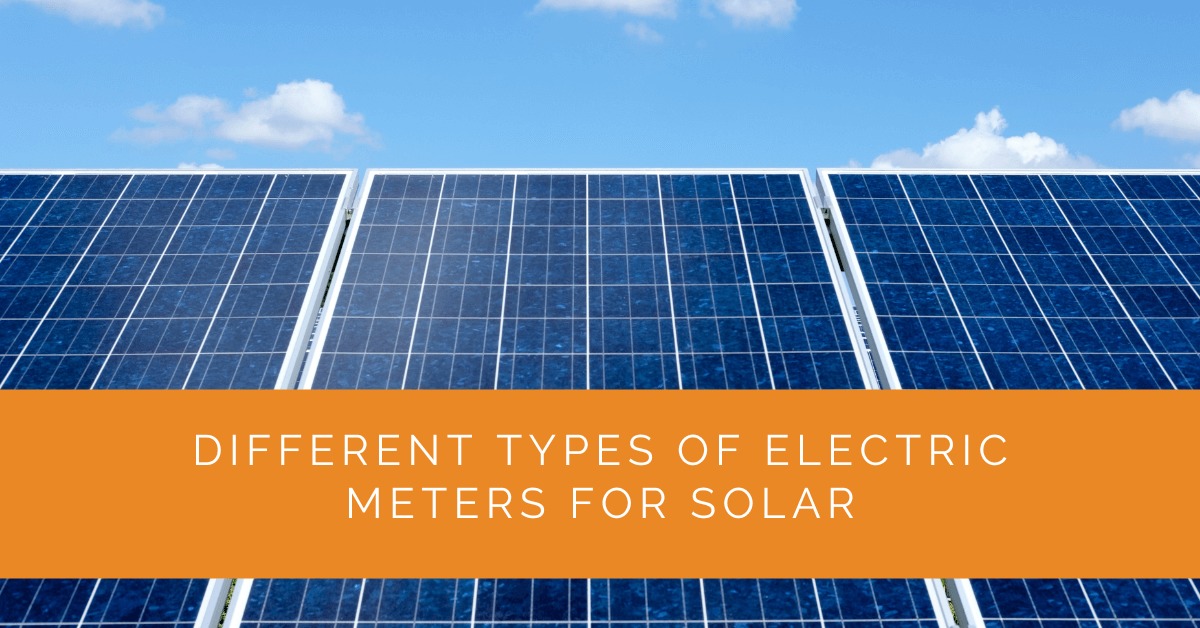Electric meters are crucial in solar energy systems, allowing accurate electricity consumption and generation tracking. Understanding the different types of electric meters is essential for solar system owners to monitor their energy usage and optimize costs effectively. This article will explore the various types of electric meters commonly used in solar installations and their functionalities.
Contents
- 1 Key Takeaways
- 2 Understanding Electric Meters
- 3 Types of Electric Meters for Solar
- 4 Choosing the Right Meter for Your Solar System
- 5 Case Study: Selecting the Right Electric Meter for a Residential Solar System
- 6 Expert Insights on Different Types of Electric Meters for Solar Systems
- 7 Experience Solar Excellence with Us!
- 8 Conclusion
- 9 FAQ
Key Takeaways
- Different electric meters, such as net, smart, and bi-directional meters, are essential for accurately measuring electricity consumption and solar power generation in solar energy systems.
- Choosing the right meter for your solar system is crucial to monitor energy usage, optimize costs, and maximize the benefits of solar power.
- Working with certified professionals and considering factors like system requirements, local regulations, and utility compatibility ensures a seamless meter selection process and accurate measurement of solar energy.
Understanding Electric Meters
Electric meters, also known as electricity meters or utility meters, are devices used to measure the amount of electrical energy consumed by a building or solar system. These meters provide crucial information for calculating electricity bills and monitoring energy usage patterns. Regarding solar systems, specific types of electric meters are utilized to accurately measure grid electricity consumption and solar power generation.
Types of Electric Meters for Solar
Net Meter
A net meter is an electric meter commonly used in solar installations. It measures the difference between the electricity consumed from the grid and the electricity generated by the solar system. When solar panels produce more electricity than what is being consumed, the excess energy is sent back to the grid, resulting in credits that can be used to offset future energy consumption. Net metering enables solar system owners to reduce their electricity bills and maximize their solar power effectively.
Smart Meter
Smart meters are advanced electric meters equipped with digital technology and communication capabilities. They provide real-time monitoring of electricity consumption and enable two-way communication between the utility company and the solar system owner. Smart meters offer detailed insights into energy usage patterns, allowing users to identify peak consumption times and adjust their habits accordingly. Additionally, they facilitate time-of-use pricing, where electricity rates vary based on the time of day. Smart meters empower solar system owners to optimize energy usage and save costs.
Bi-Directional Meter
A bi-directional meter is specifically designed to measure the flow of electricity in both directions. It accurately tracks the import and export of electricity in a solar system. When solar panels generate more electricity than consumed, the excess energy is returned to the grid. In contrast, energy is drawn from the grid during higher consumption. Bi-directional meters are crucial in accurately measuring the net energy exchange and facilitating net metering for solar system owners.
Accumulation Meter
Accumulation meters, also known as totalizers or kilowatt-hour (kWh) meters, measure the total amount of electricity consumed or generated over a specific period. These meters provide cumulative data for both grid electricity and solar energy generation. Accumulation meters are useful for evaluating the overall performance of a solar system, tracking energy savings, and determining the installation’s return on investment (ROI).
Consumption Meter
A consumption meter measures the energy consumption of specific appliances or loads within a building or solar system. It helps solar system owners identify energy-intensive devices and optimize their energy usage. By monitoring the consumption of individual appliances, users can make informed decisions about energy-efficient practices and potentially reduce electricity costs.

Choosing the Right Meter for Your Solar System
Selecting the appropriate electric meter for your solar system is essential to ensure accurate measurement and billing. Consider the following factors when choosing a meter:
- System Requirements: Understand the specific requirements of your solar system, including its capacity, generation potential, and connectivity with the utility grid.
- Local Regulations: Familiarize yourself with the local regulations and utility policies regarding electric metering for solar systems. Some areas may have specific metering requirements or restrictions.
- Utility Compatibility: Consult with your utility company to determine the type of metering they support and any specific options available for solar system owners.
By considering these factors and consulting with professionals, you can make an informed decision when choosing the right electric meter for your solar system. Ensure the meter is compatible with your solar power generation and monitoring needs.
Case Study: Selecting the Right Electric Meter for a Residential Solar System
Background
Solar Panels Network USA recently assisted Mr. and Mrs. Stuart, homeowners in California, in selecting the appropriate electric meter for their new solar panel installation. The Stuarts aimed to optimize their energy consumption, reduce electricity bills, and leverage the benefits of solar power effectively.
Project Overview
1. Understanding Energy Needs and Goals
The Stuarts wanted to achieve substantial energy savings and potentially generate surplus electricity to benefit from net metering credits. They sought a solution that would provide detailed insights into their energy usage and generation.
2. Site Assessment and Solar System Design
Our team conducted a thorough site assessment to determine the solar system’s capacity and potential energy production. Based on the assessment, we designed a 5 kW solar panel system to meet the Stuarts’ energy needs.
Evaluating Metering Options
1. Net Meter
A net meter was considered due to its ability to measure the difference between electricity consumed and generated, allowing the Stuarts to receive credits for excess energy sent back to the grid.
2. Smart Meter
We evaluated smart meters for their real-time monitoring capabilities and two-way communication with the utility company. This option would enable the Stuarts to track their energy usage patterns and optimize their consumption based on time-of-use pricing.
3. Bi-Directional Meter
A bi-directional meter was also reviewed for its precise tracking of energy import and export, crucial for accurate net metering and billing.
Decision and Implementation
Choosing the Smart Meter
After discussing the options, the Stuarts chose a smart meter for its comprehensive features. The real-time data and advanced monitoring capabilities aligned perfectly with their goals of optimizing energy usage and maximizing cost savings.
Installation and Configuration
Our team installed the smart meter, ensuring seamless integration with the solar panel system. The smart meter was configured to provide real-time data on energy consumption, solar generation, and net energy exchange.
Results
Enhanced Energy Management
The smart meter enabled the Stuarts to monitor their energy usage patterns accurately. They adjusted their consumption during peak sunlight hours to maximize solar energy use and minimize grid dependency.
Cost Savings and Efficiency
With the smart meter, the Stuarts could leverage time-of-use pricing, reducing their electricity bills significantly. The real-time data allowed them to make informed decisions about their energy consumption, leading to optimized efficiency and cost savings.
Net Metering Benefits
The smart meter facilitated accurate net metering, ensuring the Stuarts received fair credits for excess energy sent back to the grid. This further enhanced their financial savings and return on investment in the solar panel system.
Summary
Selecting the right electric meter, such as a smart meter, can significantly enhance the benefits of a solar panel system. The Stuarts’ experience highlights the importance of understanding energy needs, evaluating metering options, and leveraging advanced monitoring capabilities to achieve optimal energy management and cost savings.
Expert Insights on Different Types of Electric Meters for Solar Systems
Electric meters are fundamental in optimizing solar energy systems. Net meters, in particular, provide a balanced view of energy consumption and generation, allowing homeowners to maximize their solar investment efficiently.
Solar Energy Engineer
Smart meters are revolutionizing solar energy management by providing real-time data and enabling dynamic pricing models. This empowers consumers to adjust their energy usage patterns for cost savings and efficiency.
Renewable Energy Specialist
Choosing the right meter involves understanding your solar system’s specific needs and local regulations. Professional guidance ensures that the selected meter accurately reflects energy flows and complies with utility standards.
Senior Solar Technician
Experience Solar Excellence with Us!
Trust in Solar Panels Network USA, where our seasoned experts deliver top-quality solar solutions for homes and businesses nationwide. With a legacy of countless successful installations and a commitment to sustainable energy, we’re your reliable partner in the solar journey. Ready for a brighter, eco-friendly future? Call us now at (855) 427-0058 and harness the power of the sun!
Conclusion
The different types of electric meters play a vital role in solar energy systems by accurately measuring electricity consumption and generation. Choosing the right meter for your solar system is crucial for monitoring energy usage, optimizing costs, and maximizing the benefits of solar power. Whether it’s a net meter, smart meter, bi-directional meter, accumulation meter, or consumption meter, each type offers unique functionalities to meet specific needs.
Understanding the capabilities and compatibility of different meter types allows you to make informed decisions when selecting the appropriate meter for your solar system. Consider system requirements, local regulations, and utility compatibility to ensure accurate measurement and compliance. Consulting with certified electricians or solar installers will provide valuable guidance throughout the meter selection process.
Electric meters enable solar system owners to track their energy consumption, monitor solar generation, and assess the performance of their systems. They are essential tools for accurate billing, evaluating energy savings, and making informed decisions regarding energy usage. With the right meter in place, you can confidently embrace the benefits of solar power, reduce your environmental impact, and potentially achieve long-term cost savings. Embrace the power of electric meters in your solar journey and unlock the full potential of renewable energy.
FAQ
What type of meter is used with solar panels?
Solar panels typically use a variety of electric meters depending on the specific needs and requirements of the solar system. Common types of meters used with solar panels include net, smart, bi-directional, accumulation, and consumption meters.
What are the different types of solar meters?
There are several different types of electric meters used in solar installations. Some of the common types of solar meters include:
- Net Meters: These meters measure the difference between the electricity consumed from the grid and the electricity generated by the solar panels.
- Smart Meters: Smart meters provide real-time monitoring of electricity consumption and offer advanced features such as two-way communication with utility companies.
- Bi-Directional Meters: Bi-directional meters accurately measure the flow of electricity in both directions, allowing tracking of grid electricity import and solar energy export.
- Accumulation Meters: Also known as totalizers or kWh meters, accumulation meters measure the total amount of electricity consumed or generated over a specific period.
- Consumption Meters: Consumption meters measure the energy consumption of specific appliances or loads within a building or solar system.
What is the most common type of electricity meter?
The net meter is the most common electricity meter used across various applications, including solar installations. Net meters measure the electricity consumed from the grid and the excess electricity generated by solar panels and sent back to the grid. This type of meter allows for accurate tracking of the net energy exchange between the solar system and the utility grid, facilitating net metering and potential cost savings for solar system owners.
About the Author
Solar Panels Network USA stands at the forefront of solar energy solutions, driven by a team of seasoned solar engineers and energy consultants. With over decades of experience in delivering high-quality solar installations and maintenance, we are committed to promoting sustainable energy through customer-centric, tailored solutions. Our articles reflect this commitment, crafted collaboratively by experts to provide accurate, up-to-date insights into solar technology, ensuring our readers are well-informed and empowered in their solar energy decisions.

